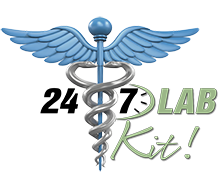Pros and Cons of At-Home STD Testing: A Comprehensive Guide by 247Labkit

Pros of At-Home STD Testing
- Privacy and Convenience: At-home STD testing offers unparalleled privacy and convenience. You can order a testing kit discreetly online, collect your samples at home, and return them via mail. This eliminates the need for face-to-face interactions and allows you to maintain confidentiality throughout the testing process.
- Comfortable Testing Environment: Some individuals may feel more at ease testing for STDs in the comfort of their own homes. Being in a familiar environment can alleviate stress and anxiety, making it easier to collect accurate samples.
- Time and Cost Savings: At-home STD testing saves you time by eliminating the need for appointments, travel, and waiting in crowded clinics. Additionally, it can be a cost-effective alternative, as you often pay a one-time fee for the testing kit, which includes laboratory analysis and results.

Cons of At-Home STD Testing
- Potential for User Error: Collecting samples at home requires careful adherence to instructions to ensure accurate results. Mistakes in sample collection, labeling, or shipping could lead to incorrect outcomes or the need for retesting.
- Limited Counseling and Support: While at-home STD testing provides anonymity, it may lack the guidance and support that a healthcare professional can offer. In a clinical setting, healthcare providers can provide counseling on safe sexual practices, answer questions, and provide appropriate referrals.
- Inability to Test for All STDs: At-home STD testing typically covers the most common sexually transmitted infections, such as chlamydia, gonorrhea, syphilis, and HIV. However, it may not encompass the full spectrum of STDs. If you suspect exposure to less common infections, it is advisable to consult a healthcare provider for comprehensive testing.
- Delayed Treatment and Follow-up: In the case of a positive result, at-home STD testing may cause a delay in accessing timely treatment and follow-up care. This delay could potentially impact your health and the risk of transmitting the infection to others.
Remember, 247Labkit is a Leading Option for Quality At-Home STD Testing

At-home STD testing offers privacy, convenience, and accessibility, making it a viable option for many individuals. However, weighing the pros and cons before deciding on this method is essential. While at-home testing provides convenience and anonymity, it may lack the guidance and support of healthcare professionals. Additionally, it may not cover all sexually transmitted infections and could potentially result in delayed treatment.
Consider your personal preferences, risk factors, and the specific STDs you wish to screen for when choosing between at-home STD testing and traditional clinic-based testing. Should you choose the at-home route, 24-7Labkit offers a wide range of at-home STD testing kits, providing you with accessible options for monitoring your sexual health.
Visit our test kit page to learn more and make an informed decision about your testing needs.







Comments are closed